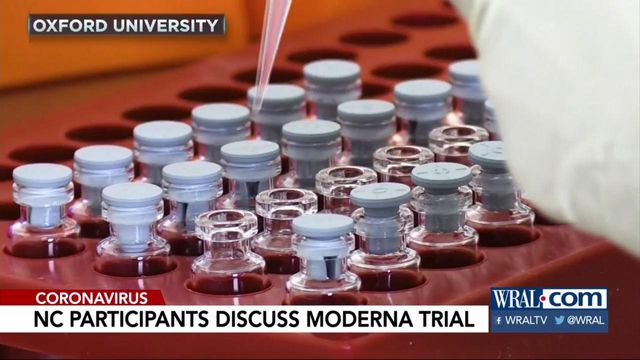Moderna plans to begin testing its coronavirus vaccine in children
Drugmaker Moderna said Wednesday that it would soon begin testing its coronavirus vaccine in children ages 12 to 17. The study, listed Wednesday on the website clinicaltrials.gov, is to include 3,000 children, with half receiving two shots of vaccine four weeks apart, and half getting placebo shots of salt water.
Posted — UpdatedDrugmaker Moderna said Wednesday that it would soon begin testing its coronavirus vaccine in children ages 12 to 17. The study, listed Wednesday on the website clinicaltrials.gov, is to include 3,000 children, with half receiving two shots of vaccine four weeks apart, and half getting placebo shots of salt water.
But the posting says the study is “not yet recruiting,” and Colleen Hussey, a spokeswoman for Moderna, said it was not certain when the testing sites would be listed or start accepting volunteers. A link on the website to test centers is not yet working, and Hussey said she was not sure when it would become active.
Moderna announced Monday that data from its study in 30,000 adults had found its vaccine to be 94.1% effective and that it had applied to the Food and Drug Administration for emergency authorization to begin vaccinating adults. If approval is granted, certain groups of high-risk adults, including people in nursing homes, could receive shots late in December.
But no vaccine can be widely given to children until it has been tested in them. Vaccines meant for both adults and children are generally tested first in adults to help make sure they are safe for pediatric trials.
Moderna’s vaccine has not yet been studied in children or pregnant women. In the new clinical trial in adolescents, girls past puberty will be tested before each injection to make sure they are not pregnant.
“Everyone anticipates that when we test this first in adolescents, then older children, then the real small kids, that the COVID vaccine will work,” said Dr. William Schaffner, an infectious disease specialist at Vanderbilt University and an adviser on vaccines to the Centers for Disease Control and Prevention.
But children have more active immune systems than adults and may have stronger reactions, including more fever, muscle and joint aches, and fatigue, Schaffner said.
“They may be more out of sorts than adults for a day or two,” he said. “You really do want to know, if it’s given in adolescents, what can parents expect? You really want to be able to tell them clearly how you might feel for 24 or 48 hours after you receive the vaccine. And obviously, we really want to be able to tell parents it works.”
If a child had intense side effects and parents were not prepared for it, they might be reluctant to go back for the second shot, Schaffner said.
Dr. Paul Offit, a vaccine expert at Children’s Hospital of Philadelphia, said that vaccines “for the most part” work equally well in children and adults. Occasionally, as with the hepatitis B vaccine, different doses are required, he said. Moderna will study the same dose in children that it has tested in adults.
Pfizer began testing its coronavirus vaccine in children as young as 12 in October. A large clinical trial found its vaccine to be 95% effective in adults, and the company has requested emergency authorization from the FDA. Britain approved the Pfizer vaccine for adults Wednesday, the first country to do so.
AstraZeneca has also tested its vaccine in children, but not in the United States.
As vaccine studies have moved forward, rumors have spread on social media, particularly among people who oppose vaccines in general, that President-elect Joe Biden plans to require vaccination for everyone, including children. His team has denied those claims, and Biden has said that he will rely on scientists’ advice for the best way to end the pandemic.
Related Topics
Copyright 2024 New York Times News Service. All rights reserved.





